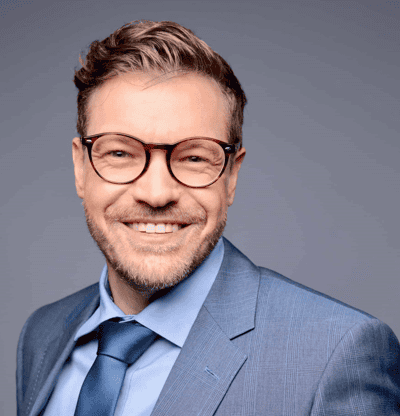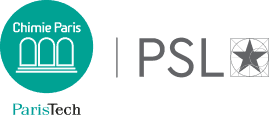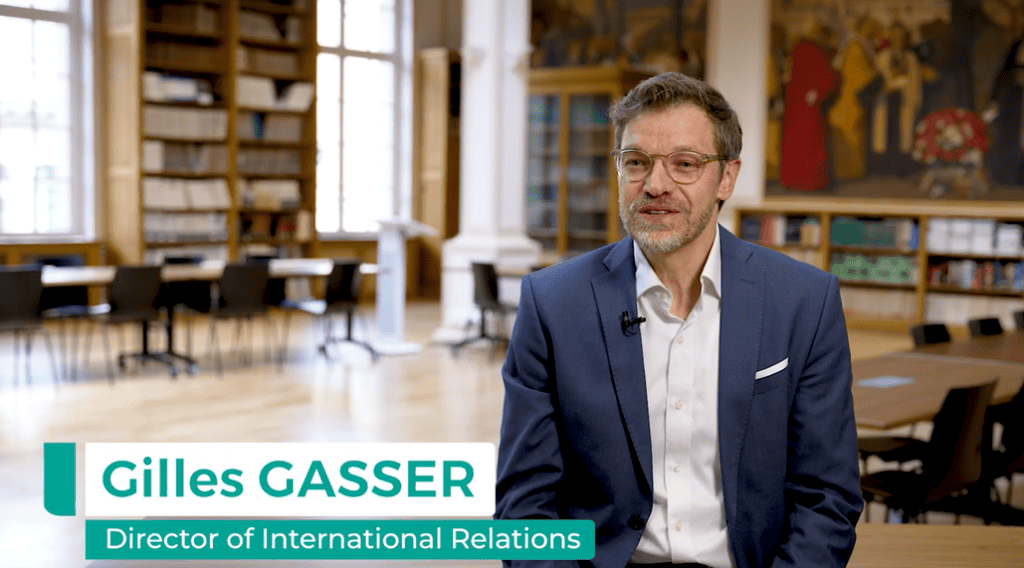Gilles Gasser, new Dean of International Affairs at Chimie ParisTech-PSL

Gilles Gasser is the new Director of International Relations at Chimie ParisTech-PSL. He succeeds Fethi Bedioui, CNRS Research Director Emeritus and Chimie ParisTech-PSL Associate Professor Emeritus, who has retired. Gilles Gasser took up his new post on September 2.
Gilles Gasser is currently Professor at Chimie ParisTech-PSL and Deputy Dean of the Institute of Chemistry for Life and Health Sciences. He was born, raised and educated in Switzerland. After a PhD thesis in supramolecular chemistry with Prof. Helen Stoeckli-Evans (University of Neuchâtel, Switzerland), Gilles completed two post-doctorates, first with the late Prof. Leone Spiccia (Monash University, Australia) in bioinorganic chemistry and then as an Alexander von Humboldt Fellow with Prof. Nils Metzler Nolte (Ruhr-University Bochum, Germany) in bioorganometallic chemistry. In 2010, Gilles began his independent scientific career at the University of Zurich as an Ambizione Fellow of the Swiss National Science Foundation (SNSF) before being awarded an SNSF Assistant Professorship in 2011. In 2016, Gilles joined Chimie ParisTech-PSL with a PSL Chair of Excellence. He has received several grants and awards, including the Alfred Werner Prize from the Swiss Chemical Society, an ERC Consolidator grant (2016) and an ERC Proof of Concept (2023), the Jucker Prize for his contribution to cancer research, the European Medal for BioInorganic Chemistry (EuroBIC), the Pierre Fabre Prize for therapeutic innovation from the Society for Therapeutic Chemistry (SCT) in 2020 and recently the Coordination Chemistry Prize from the French Chemical Society (Senior Level). His research focuses on the use of metal complexes in various fields of medicinal and biological chemistry.
Gilles, what will be your roadmap/strategy at Chimie ParisTech-PSL’s International Affairs Department?
First of all, I would like to thank the Director of Chimie ParisTech-PSL, Christian Lerminiaux, for the trust he has placed in me by taking on this new role. I am really looking forward to starting this new job. International relations are fundamental in all areas of society, and particularly in the sciences, to provide more rapid and relevant responses to the global challenges we face today. I am a “product of the benefits of internationalization. During my career, I have had the opportunity to study and work in five different countries, and these experiences have changed my life.
Christian Lerminiaux, director of Chimie ParisTech-PSL, entrusted me with the following main assignments:
1) Develop the school’s attractiveness based on our excellent training and within the framework of a common PSL strategy and aim for 30% of international students with excellent profiles on campus.
2) Encourage the mobilization of our teaching and student communities to define and implement a European engineering model rooted in society, within the European University EELISA.
3) Establish strategic training-research partnerships with several prestigious international institutions.
4) Increase the number of Horizon Europe projects (Marie Skłodowska-Curie grants, doctoral student networks, etc.) through greater support for researchers.
5) Provide even more support for our incoming and outgoing students, to make their intercultural experience as easy and enriching as possible, with the help of my team composed by Séverine Fogel and Charlène Férard.
Fethi Bedioui and Antoine Mercier have done a tremendous job in International Relations over the last few years and have built a solid foundation on which we will capitalize to build a roadmap over the coming months, together with the entire Chimie ParisTech-PSL community. Don’t hesitate to come and meet us.
Selected bibliography :
1. Structurally Simple Osmium(II) Polypyridyl Complexes as Photosensitizers for Photodynamic Therapy in the Near Infrared
A. Mani, T. Feng, A. Gandioso, R. Vinck, A. Notaro, L. Gourdon, P. Burckel, B. Saubaméa, O. Blacque, K. Cariou, J.-E. Belgaied, H. Chao,* and G. Gasser,* Angew. Chem. Int. Ed., 2023, 62, e202218347.
DOI: https://doi.org/10.1002/anie.202218347
2. Ru(II)/Os(II)-based Carbonic Anhydrase Inhibitors as Photodynamic Therapy Photosensitizers for the Treatment of Hypoxic Tumours
Y. Wang, P. Mesdom, K. Purkait, B. Saubaméa, P. Burckel, K. Cariou,* T. Rossel,* and G. Gasser,* Chem. Sci., 2023, 14, 11749-11760.
DOI: https://doi.org/10.1039/D3SC03932C
3. A Near-Infrared Light-Activatable Ru(II)-Coumarin Photodynamic Therapy Photosensitizer Active under Hypoxic Conditions
E. Ortega-Forte, A. Rovira, M. López Corrales, A Hernández García, F.J. Ballester, E. Izquierdo-García, M. Jordà-Redondo, M. Bosch, S. Nonell, M. Dolores Santana, J. Ruiz,* V. Marchán* and G. Gasser,* Chem. Sci., 2023, 14, 7170-7184.
DOI: https://doi.org/10.1039/D3SC01844J
4. Polymeric Encapsulation of a novel Ruthenium(II) Polypyridyl Complex: From Synthesis to in vivo Studies against High-Grade Epithelial Ovarian Cancer
J.P.M. António, A. Gandioso F. Nemati, N. Soliman, R. Vinck, F. Sun, C. Robert, P. Burckel, D. Decaudin, C.M. Thomas* and G. Gasser,* Chem. Sci., 2023, 14, 362-371.
DOI: https://doi.org/10.1039/D2SC05693C
5. Rationally Designed Ruthenium Complexes for 1- and 2-Photon Photodynamic Therapy
J. Karges, S. Kuang, F. Maschietto, O. Blacque, I. Ciofini, H. Chao,* and G. Gasser,* Nature Commun., 2020, 11, 3262.
DOI: https://www.nature.com/articles/s41467-020-16993-0

